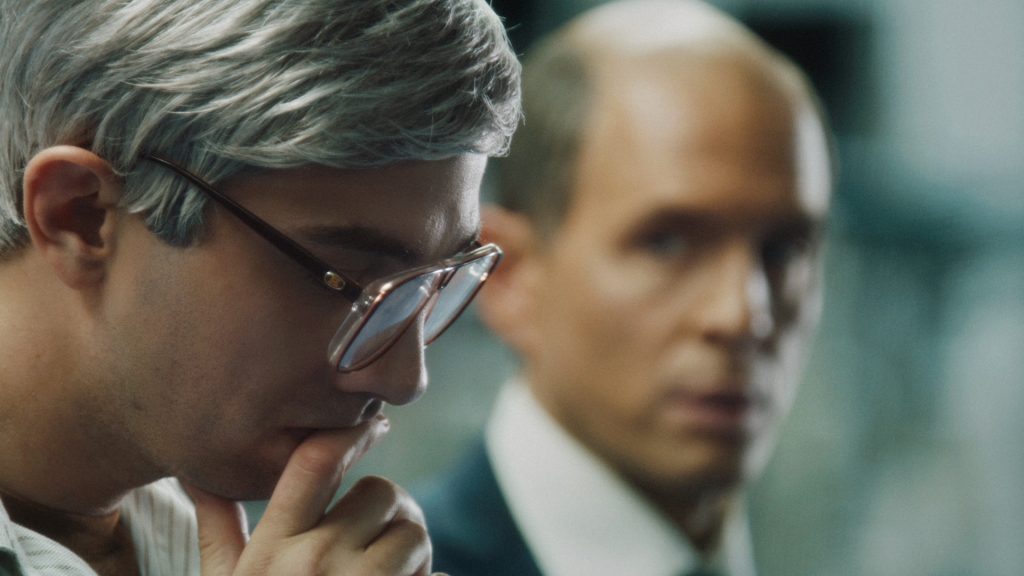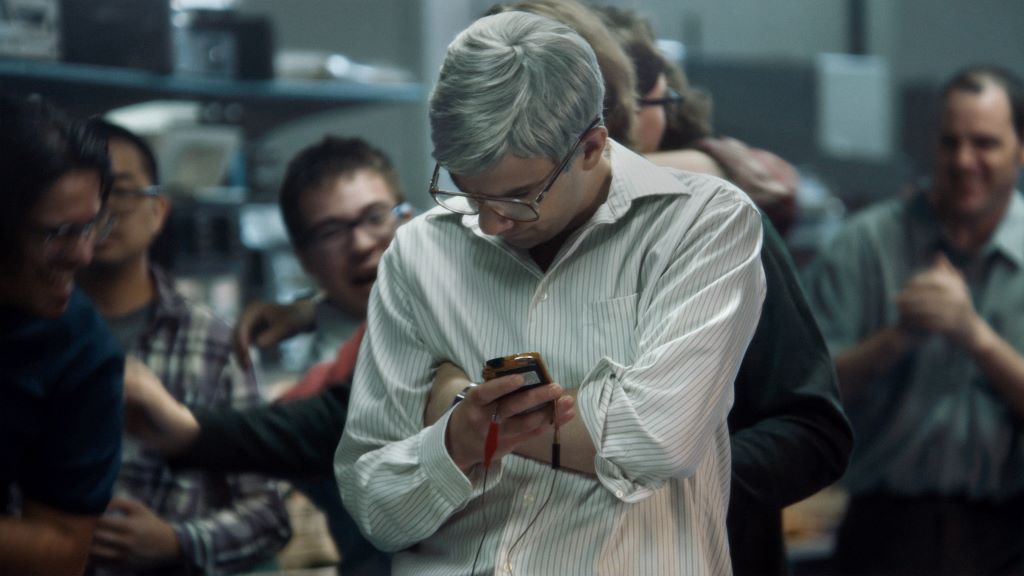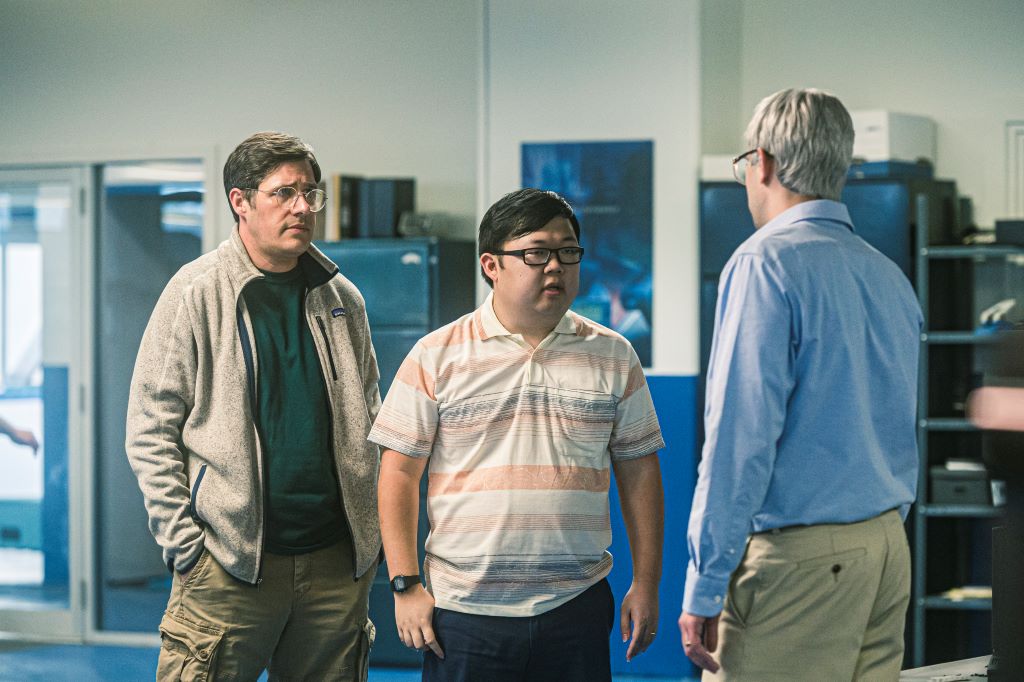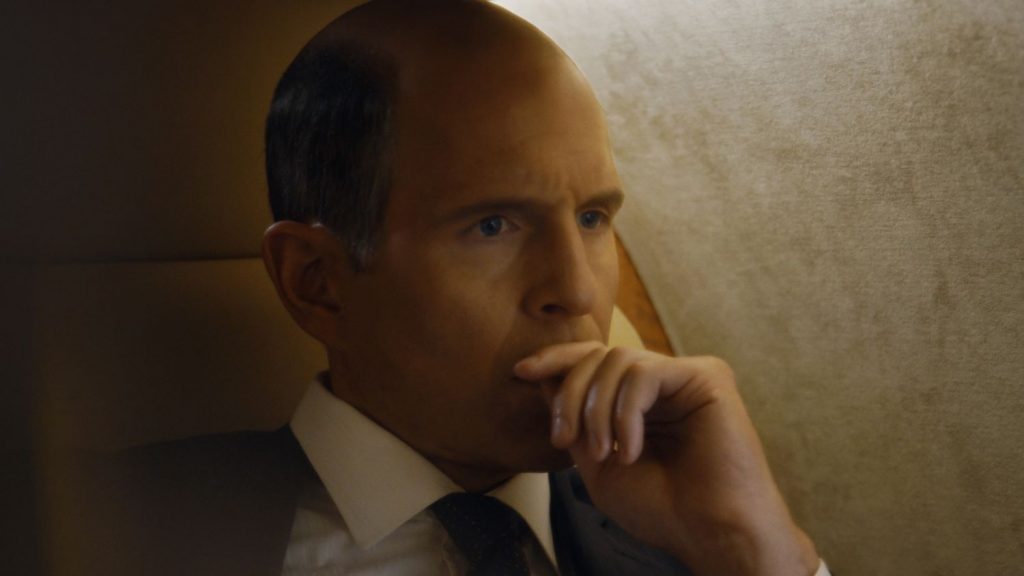Reviews include Irena’s Vow, The Beast, and Before I Change My Mind.
BlackBerry Film Duo Reveals ‘Top Secret’ Production Stories
February 28, 2024

The video-interview icebreaker I’d planned for BlackBerry creators Matt Johnson and Matthew Miller was to open the sticky top drawer of my wooden desk and haul out a small collection of battered, once beloved BlackBerry devices.
Technology had other plans for us that morning. Unable to show off my historical phones to the filmmakers, I proceeded to ask them about their first encounters with the gadgets.
“I never touched [a BlackBerry] before we started shooting the film,” admitted Johnson, the film’s director and co-writer, who also plays a key character.
“I produced my first two movies using hand-me-down BlackBerries,” said producer and co-writer Miller. A brief, nerdy exchange about fast thumb-typing on tiny keyboards ensued, and then he added, “When we got them during pre-production, I was very rusty. I had converted to my iPhone. People say things like, ‘Oh, I wish I could get [the keyboard] back,’ but (pause) I actually don’t think people want that.”
People certainly did want that in the late ’90s when the first BlackBerry pager emerged through Waterloo startup Research In Motion (RIM) and kickstarted the trend of suddenly turning away from people you’re talking to and looking down at your hands. BlackBerry’s revenues grew through most of the 2000s as its coveted smartphones were embraced and constantly fondled by politicians, financiers, and daily journalists. Then so-called BlackBerry people started getting caught with “backup” iPhones in their purses, and it was all over. At least that’s how I remember it.

A more accurate and detailed chronicle of the Canadian tech company can be found in Losing the Signal: The Untold Story Behind the Extraordinary Rise and Spectacular Fall of BlackBerry, Canadian business writer Jacquie McNish and technology writer Sean Silcoff’s notable 2015 book, which inspired the screen project that Johnson created in both feature and mini-series form.
The CBC, which is currently streaming the three-part limited series version of BlackBerry on Gem, initially optioned the book and, at some point, approached Rhombus Media to get involved. Rhombus founder and president Niv Fichman introduced the book to Johnson and Miller, who have worked together—in the company of many longtime creative collaborators—on a string of edgy, fact-and-fiction-mingling productions, including the Slamdance Grand Jury Prize winning feature The Dirties (2013) and Sundance-premiering conspiracy thriller Operation Avalanche (2016).
“I don’t know exactly what Niv saw in us or in Matt’s voice as a filmmaker, but he thought that there’d be something interesting about mixing our approach and aesthetic with this story,” Miller said. “When we first read the book, we weren’t really sure how to get in or what our access point was because neither Matt nor I knew much about those worlds.”
The entry point for the filmmakers was the dynamic between RIM co-founders Mike Lazaridis (played by Jay Baruchel) and Douglas Fregin (Matt Johnson) and the company’s transformative investor and future co-CEO Jim Balsillie (Glenn Howerton). Miller continued, “We began to realized that a startup in the ’90s that was trying to make a phone that could change the world was not so dissimilar to our experience of toiling in the Canadian independent film landscape for a decade trying to make work with our close friends and colleagues while, at the same time, trying to keep the lights on.”

In an early scene, Lazaridis, Fregin, and their motley crew of engineers crack open electronic gadgets and rummage through electrical supply store parts to build a prototype. When the filmmakers were “cracking” the story into four different eras, which were to become separate episodes, they found deeper, even personal connections in the material and thought a feature would be a better model.
It was all very top secret for a while.
“We were intentionally making it without anybody knowing that we were making it, mostly because we didn’t want people to get the wrong idea,” Johnson said. “We didn’t want [the film to have] the influence of the company or the actual people, because we knew what we wanted.”
For example, Johnson’s headband-wearing Fregin is what Miller refers to as a “classic movie amalgam, where we took some characteristics and traits from other engineers. In real life, there’s not much known about Doug Fregin—he really did retreat from public life. I think he was a pretty shy guy—which the character Matt plays is not.”
One “actual person” they did meet was an engineer from RIM’s earliest group of employees. “He’d kept a photo journal,” Miller said. “So he sent us around 3,000 images and that helped inform production design and wardrobe and also the characters: these guys would do things like go into the parking lot with potato cannons and launch up.”
The lengthy research process focused on gathering physical details and information in order to devise authentic spaces and situations for the actors and crew to work in. Original sites of the offices were explored, restaurants in Kitchener and Waterloo frequented by the three characters were visited, and archival photographic evidence from that era was gathered.
Miller credits the hands-on, detail-driven work of production designer Adam Belanger and his team for creating an authentic, lived-in vibe that was further enhanced by cinematographer Jared Raab’s deliberate “caught on the fly” style of long zooms (both in and out) and other camera-related choices.
“Early on, Matt Johnson had this idea that the engineers in the (RIM) room, early in the film, should be played by people he had a relationship with,” Miller said. “Most of those people are non-actors, mostly local Toronto, filmmakers and musicians. We like the style of just turning on the cameras to get a lived-in feeling, and it’s hard to do that with actors who show up on the day and don’t know each other.
“It was really good instinct and certainly paid dividends because it feels like those guys are there all the time playing video games—and you know, they are playing the actual video games.”
Jay Baruchel, who knew the filmmakers but hadn’t worked directly with them, was attached to the project early on. Miller, noting his bias, thinks Baruchel’s performance as Lazaridis is the best of his career. “It took people by surprise both because of the physical transformation, obviously, and how he found so much humanity in the character.”

The filmmakers were “fans from afar” of Glenn Howerton, who is best known for his role in the long-running series It’s Always Sunny in Philadelphia (2005-present), which he also co-created and writes on. “When we finally connected with him, we were in prep with only five or six weeks to production,” Miller said. “He read the script, had a great conversation with Matt, and two weeks later, he was on a plane coming to Toronto and shaving his head for us.
Howerton’s dynamic yet intimate performance as Jim Balsillie has received widespread praise and numerous accolades, including the TFCA’s inaugural Outstanding Performance in a Canadian Film award, along with a nomination for Outstanding Supporting Performance.
Howerton’s first day in production may have helped set the tone for the character, Miller said. “We didn’t introduce him to any of the [guys playing the] engineers, and we didn’t show him the sets before we started shooting. In that scene where he comes to RIM for the first time and the guys are goofing around and Matt’s character has broken the computer monitor—[Howerton’s] reaction at the door, as he’s taking it in and thinking, ‘Oh, fuck, what have I got myself into?’ That could not be more real.
“Obviously that plays in the moment beautifully.”
Composer Jay McCarrol—an executive producer on BlackBerry and another longtime creative collaborator—was on set through most of the shooting and also lived with the core team in a house in Hamilton, where the film was shot. “After the first week of shooting, we all went home for the weekend, and Jay came back the next week with samples and demos–he had the idea of incorporating sounds of ’90s technology, like the dial-up modem,” Miller said. “We played them live in the room while we watched dailies, and that really brought some of the footage to life for us.
BlackBerry had its world premiere in February 2023 in the Berlinale’s competition lineup and went on to garner numerous accolades, including a spot on the National Board of Review’s Top 10 Independent Films and Canada’s Top Ten, and many awards at the Vancouver Film Critics Circle. Elevation Pictures released the theatrical version in Canadian cinemas last year. It’s now streaming on Crave.
The film is one of three nominees for this year’s Rogers Best Canadian Film award, alongside Sophie Dupuis’ Solo and Ariane Louis-Seize’s Humanist Vampire Seeking Consenting Suicidal Person. The winner will be announced at the TFCA awards gala on March 4, 2024 and receives $50,000, courtesy of Rogers, with the runners-up each getting $5,000.



